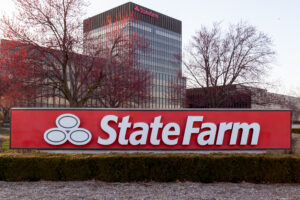Attorneys for State Farm Common, the California Division of Insurance coverage and Client Watchdog offered opening arguments in a listening to to find out the destiny of State Farm’s request for an emergency owners charge enhance yesterday.
The general public listening to in Oakland, Calif., earlier than Administrative Regulation Decide Karl-Fredric Seligman was initially set for events to current arguments for and towards a 22% charge hike. However final Friday, State Farm’s California owners insurer and CDI agreed that the determine for the interim enhance could possibly be lowered to 17%.
Importantly, that settlement not solely introduced the speed request down 5 proportion factors but additionally stipulated that State Farm Mutual—the guardian firm—would make a $400 million capital infusion into State Farm Common (through a surplus notice) and that if a full listening to, scheduled for June, finds the 17% is just not actuarially supported, then the corporate will repay policyholders with curiosity.
In late February, when executives from State Farm Common and representatives of Client Watchdog informally met with California Insurance coverage Commissioner Ricardo Lara, Lara pressed to get some assurance that State Farm Mutual would step in to shore up the monetary situation of its California subsidiary, which executives offered as a dire one—falling near regulatory motion ranges and prompting detrimental actions from score companies. He additionally requested State Farm Common to contemplate pausing beforehand deliberate coverage nonrenewals, a concession that an govt mentioned wasn’t doubtless on the time though he did agree that making a dedication to not nonrenew any extra prospects was a chance.
Associated: S&P Places State Farm Common Rankings on CreditWatch; State Farm Stronger as Underwriting Losses Shrink—However Not in California
That final dedication is ready forth within the settlement documented by CDI and State Farm Common late final week. “Moreover, the Events stipulate and agree that Applicant [State Farm General] shall not provoke any new block nonrenewal program(s) within the strains represented by the Functions by way of year-end 2025,” the April 4 amended stipulation doc says.
On March 14, Lara had provisionally accredited State Farm’s request for an emergency 22% interim charge enhance, provided that the corporate may justify it with information within the public listening to scheduled to begin yesterday. On the time, he known as on State Farm to halt nonrenewals and pursue a $500 million capital infusion from its guardian firm to revive monetary stability.
The primary a number of hours of yesterday’s ALJ listening to, open to the general public and accessible to view through livestream, had been dedicated to procedural issues together with whether or not the 17% amended stipulation was filed on time, whether or not an actuary who does work for CDI may testify on behalf of State Farm Common, and whether or not the dialogue of State Farm Common’s monetary situation or it’s risk-based capital degree ought to even be offered at a charge listening to.
“Charges should mirror precise danger and prices—not an effort to revive earnings or keep credit score scores,” Client Watchdog mentioned in an announcement, echoing arguments made by the patron group’s attorneys William Pletcher and Ryan Mellino on the listening to. Client Watchdog is serving because the intervenor in accordance with provisions of Proposition 103.
Throughout opening arguments, Katherine Wellington of the legislation agency Hogan Lovells U.S., representing State Farm Common, famous that the January 2025 wildfires had made State Farm Common’s monetary situation even worse than it was when the corporate initially filed for charge will increase final yr, with surplus now all the way down to $600 million versus $4 billion only a decade in the past in 2015.
Associated: State Farm Has Paid Out $2.5 Billion for LA Wildfires
Nikki McKennedy, assistant chief counsel in CDI’s Price Enforcement Bureau, argued that the commissioner has each proper to contemplate the insurer’s solvency. “Client Watchdog contends the commissioner doesn’t have authority to do something however rigidly apply his personal ratemaking components and that the commissioner should deny State Farm’s request for emergency aid as a result of they haven’t demonstrated the corporate is entitled to a charge enhance underneath the components,” she mentioned, providing the reason why this concept is “with out advantage.”
She mentioned the commissioner’s ratemaking components “incorporates an categorical exception the place an organization’s solvency is at stake” and that the California Supreme Courtroom beforehand acknowledged the commissioner’s “plenary authority to take no matter steps are essential to implement Prop 103.”
“Approving State Farm Common’s emergency request for an interim charge enhance is a really crucial step. It isn’t in California customers’ greatest pursuits to permit State Farm Common, the biggest property insurer in California by far…to go bankrupt or to in any other case withdraw from the California market,” she mentioned.
“Nothing on this state of affairs is regular. The traditional guidelines don’t apply. We’re on the Titanic and we see the iceberg. Now is just not the time to argue about the place to place the deck chairs.” Asserting that it’s time as a substitute to “flip this ship round,” McKennedy mentioned, “If we don’t, [then] over 3 million Californians are going within the water and there aren’t sufficient life boats.”
Wellington argued that the interim charge “poses no danger to policyholders as a result of if the ultimate charge finally ends up being decrease than the interim charge, policyholders might be entitled to a refund of the distinction with curiosity.”
 That didn’t sit properly with Client Watchdog’s Pletcher. “A collect-now-maybe-pay-later scheme is the precise reverse of prior charge approval required by California voters” underneath Proposition 103. “[Refunds] aren’t a permission slip to cost illegal charges immediately to perhaps appropriate them later. And so they don’t insulate the corporate or the division for the authorized necessities to set charges prospectively primarily based on a full evidentiary listening to…”
That didn’t sit properly with Client Watchdog’s Pletcher. “A collect-now-maybe-pay-later scheme is the precise reverse of prior charge approval required by California voters” underneath Proposition 103. “[Refunds] aren’t a permission slip to cost illegal charges immediately to perhaps appropriate them later. And so they don’t insulate the corporate or the division for the authorized necessities to set charges prospectively primarily based on a full evidentiary listening to…”
“Refunds additionally don’t repair injury accomplished now,” he mentioned, referring to the injury to a house owner that’s pressured to pay what the patron group calculates to be $470 in added premiums, on common. That home-owner is pressured to decide on between paying a brand new premium or paying their mortgage.
Refunds, he mentioned, “don’t assist a household that will get nonrenewed or priced out and might’t discover substitute protection. These harms are quick and in lots of instances they are often irreversible. Each greenback charged underneath an unjustified charge is a greenback wrongfully taken. It’s taken from a household attempting to maintain their dwelling to place meals on the desk,” he mentioned.
He additionally launched arguments that State Farm Common’s drawback are issues of its personal making—created by maintaining charges low so as to develop market share and overpaying for reinsurance from guardian firm State Farm Mutual with no vital restoration for policyholders till this yr. (State Farm has mentioned that reinsurance recoveries will minimize $7.6 billion in direct wildfire losses all the way down to $212 million on a web foundation.)
California’s ratemaking components is “designed to match worth to danger. It’s not designed to unravel enterprise issues, to handle market volatility or restore capital,” Pletcher mentioned, arguing that State Farm can’t depend on its monetary situation to justify a charge enhance within the state underneath present legal guidelines.
Just one witness testified on the listening to after opening arguments—David Appel, an actuary who’s retired from a former place as Principal and Director of Economics Consulting at Milliman, at the moment doing consulting work for State Farm Common. On direct examination, Michael Maddigan of Hogan Lovells requested Appel to justify an announcement in his declaration not not like the argument that Wellington put forth—that there’s no danger to policyholders in granting the 17% charge enhance with the situation of potential refunds following a full Prop 103 listening to.
Stated Appel, “I don’t deny that policyholders pays the next premium within the close to time period, [but] that larger premium in my opinion is warranted as a result of the publicity and danger in California is so evidently vital.”
“I respect the wants of customers and the burdens that this may occasionally place on [them]. I’m aware of that. However I’m additionally aware of the monetary situation of the biggest insurer within the state, and the truth that insurance coverage charges should be sufficient to cowl underlying insurance coverage prices. That has not been the case for State Farm Common…for the final decade.
Appel added that he didn’t imply to counsel that an insurance coverage firm’s monetary situation “is one thing that you just put right into a charge template and decide a charge change primarily based upon. However it’s one thing the commissioner has to contemplate as a result of the commissioner’s main duty, in my opinion, is making certain the monetary solvency of the insurers underneath [his] authority.”
The actuary mentioned he believes that taking State Farm Common’s “confused monetary situation” into consideration “is solely applicable within the case of an interim charge enhance that has a dramatic degree of safety for policyholders.”
“Absent the speed enhance and absent the capital infusion, I believe it’s like rolling the cube. You don’t know what will occur to State Farm Common,” he mentioned.
“If you wish to take the chance that State Farm Common goes to stay viable and stay available in the market, I believe that’s an enormous danger to take…The opposite aspect of that’s to grant the interim charge enhance, get the $400 million surplus notice, restore to some extent the monetary situation of the corporate, after which go to a charge listening to and decide whether or not it’s affordable,” he mentioned, concluding his opinion on the query.
The listening to resumes at 10 a.m. Pacific time on Wednesday, with cross-examination of Appel by Client Watchdog on the agenda.
As soon as the listening to concludes, the decide will present the commissioner with a proposed determination for acceptance of the interim charge enhance in accordance with Insurance coverage Code (part 1861.08), based on the language of Lara’s March 14 order for the listening to provisionally granting an interim enhance. The proposed determination is to be delivered inside 10 days.
Matters
California


